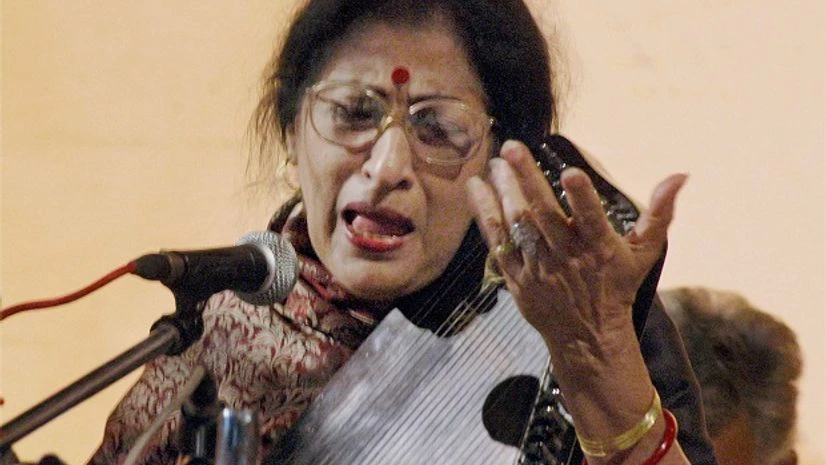A large number of doyens of classical music and the entertainment industry, admirers and others converged on Tuesday to pay tribute and offer their last respects to legendary Hindusani classical singer Kishori Amonkar, who passed away shortly before midnight on Monday.
The body of the Mumbai-born Amonkar, who breathed her last at her Dadar West home just a week before her 85th birthday, has been kept for public adarshan' at an auditorium in Dadar to enable her admirers and friends pay their last respects.
A widow, she is survived by two sons and grandchildren.
In her singing career in Indian classical music spanning over seven decades, she was revered as 'Gaan-Saraswati'.
Belonging to the Jaipur Gharana, she was conferred the Padma Vibhushan and Sahitya Akademi Award among many others.
Also Read
Leading the nation in paying tributes to Amonkar, Prime Minister Narendra Modi said today that he was "deeply pained by her demise" which is "an irreparable loss to Indian classical music."
"The works of Kishori Amonkar will always remain popular among people for years to comea May her soul rest in peace," Modi said in a message.
Veteran singer Bharat Ratna Lata Mangeshkar said she was deeply anguished to hear about Amonkar's demise.
"She was a unique and extraordinary classical singer. Her demise spells a huge loss for the world of music," said Lata Mangeshkar early today.
Others to tweet condolences included Shabana Azmi, Shreya Ghoshal, Hema Malini, Madhur Bhandarkar and Kailash Kher.
Born in Mumbai on April 10, 1932, to Madhavdas Bhatia and Mogubai Kurdikar, she paddled her first lessons in Hindustani classical music from none other than illustrious singer-mother, who was honoured with Padma Bhushan and Sangeet Natak Akademi awards.
Having lost her father at the tender age of six, Kishori took singing lessons from her mother, accompanied her to various concerts and learnt the subtle nuances of art of the Jaipur Gharana, which she later adopted as her singing style.
Later she was trained under Anjanibai Malpekar of the Bhendi Bazar Gharana, Mumbai, and music teachers of various other gharanas.
The eldest among three siblings, including younger sister Lalita and brother Ulhas, over the years, Kishori excelled in Indian Classical music and even experimented, innovated with the unique styles of Jaipur Gharana.
Her repertoire included light classical geets, thumris, bhajans and the heavy khayals, many interspersed with her own innovations and applications from other styles or gharanas, for which she became known and earned both bouquets and brickbats.
In the late 1950s, Kishori had suddenly lost her voice for inexplicable reasons for two years, but later bounced back with renewed vigour.
In between, she had married a schoolteacher Ravindra Amonkar and they had two sons, but her husband died in the early 1980s.
At one stage, she was attracted to film music and sang the solo title song for the 1964 blockbuster, V. Shantaram's "Geet Gaya Pattharon Ne", a launch-pad for his daughter Rajshree and a young actor, Jeetendra.
In 1990, after a break of over 25 years, she made a come back to films, directed the music and also sang four songs penned by the National Award winning lyricist Vasant Deo in 1990 for Govind Nihalania¿s film "Drishti", which the National Award for Best Film that year.
However, she largely stayed away from the film industry ostensibly for certain bad experiences and remained with her first love, Indian classical music.
As for her experimentations and modifying styles of the Jaipur gharana by introducing unique characteristics of other gharanas, bypassing traditions to prioritizing emotional expressions, making her deviate from the regular rhythmic, melodic or structural norms.
Her aim was to imbibe an emotional appeal of the more popular styles into the starkly resolute classical music traditions, experts noted.
A singer, creator, innovator and teacher and even labeled occasionally as being 'temperamental' for protecting the dignity of singers and musicians, she trained many classical singers and even lectured extensively on the role of 'Rasa' or emotions in music during her long career.
Amonkar was conferred scores of awards and honours including the Sangeet Natak Akademi Award in 1985, Padma Bhushan in 1987, Padma Vibhushan in 2002, the Sangeet Natak Akademi Fellowship in 2009 and the Dr. TMA Pai Foundation's Outstanding Konkani Award in 1991.

)
